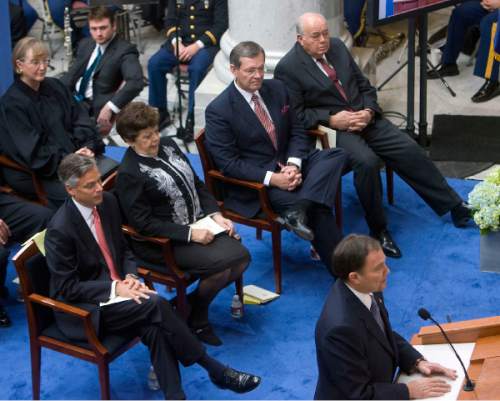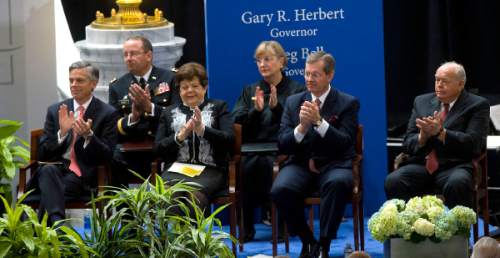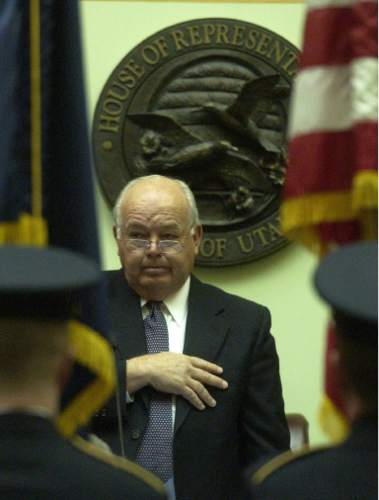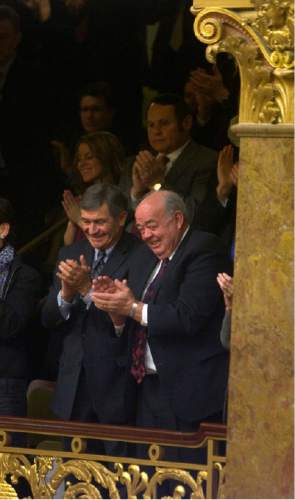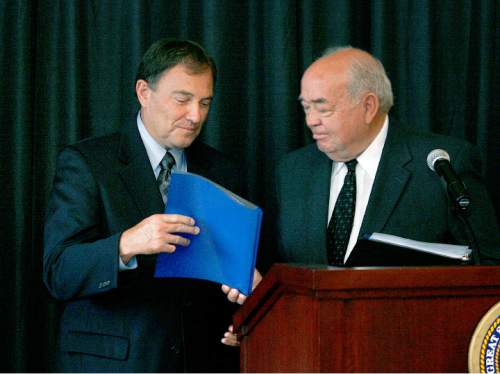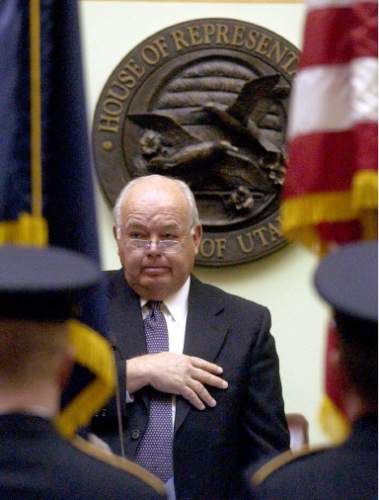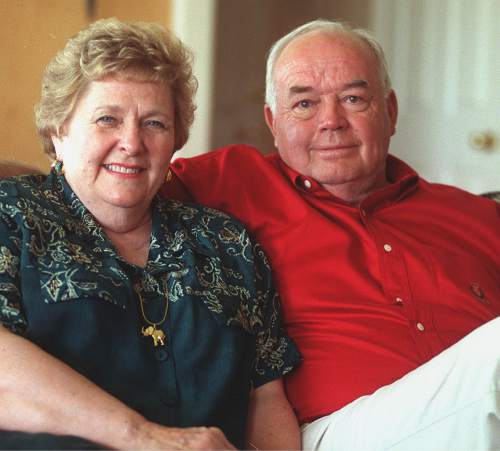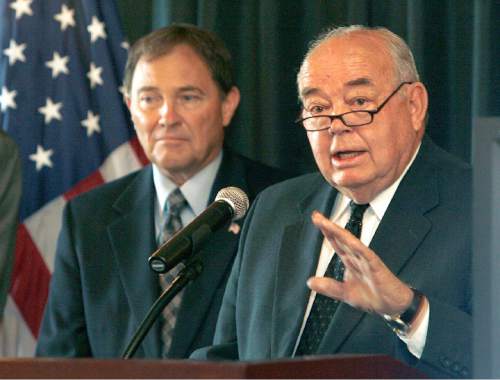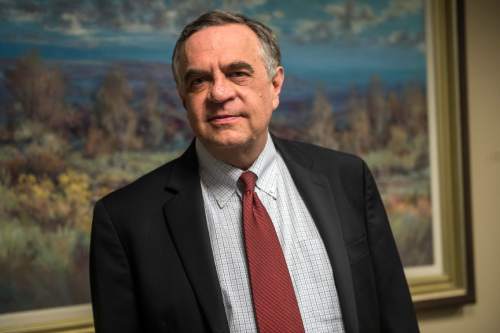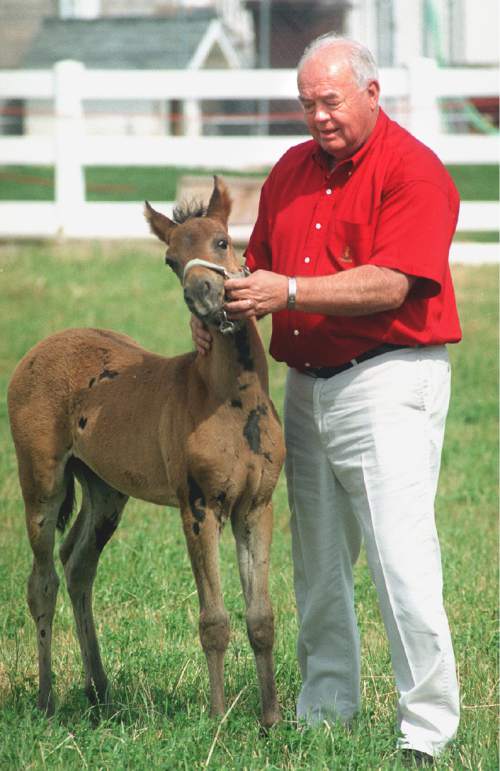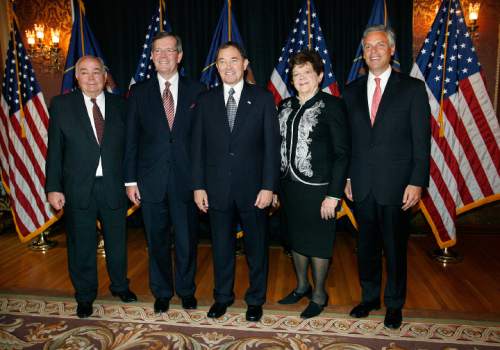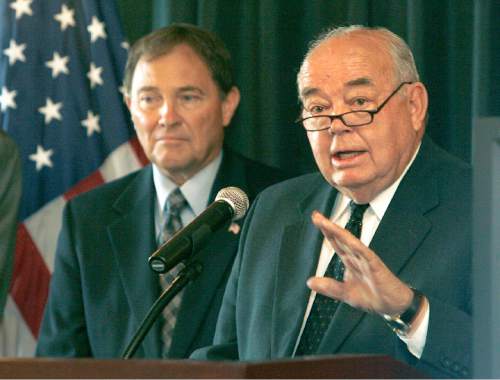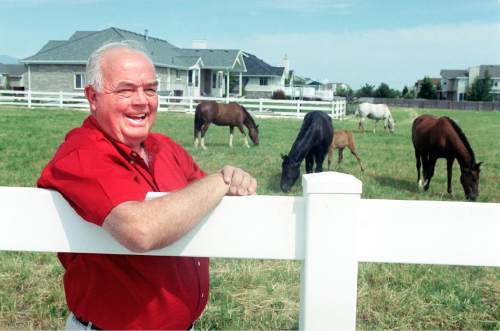This is an archived article that was published on sltrib.com in 2015, and information in the article may be outdated. It is provided only for personal research purposes and may not be reprinted.
Norm Bangerter, who served two terms as Utah's 13th governor and guided the state through floods and a sinking economy while buoying up public schools, died Tuesday after suffering a stroke.
He was 82.
Bangerter was elected governor in 1984, the first Republican to win the office in two decades, and served during a tumultuous period from 1985 to 1993.
Before that stretch, he had served 10 years in the Utah Legislature, including four years as House speaker.
Family spokesman Dave Buhler, who now is the state commissioner of higher education, spent eight years in the Bangerter administration and said that "Utah lost a great man, a great leader today."
(See this story for more quotes and reactions to Bangerter's death.)
He said the governor was in good health and that his mind was sharp, but that he suffered a stroke at home Tuesday morning, was rushed to Intermountain Medical Center and died at 4:10 p.m., surrounded by family.
Bangerter won election in 1984, defeating U.S. Rep. Wayne Owens. In 1988, he pulled out an improbable re-election in the face of a deep regional recession, having pushed through a major tax increase for education and despite challenges from popular Salt Lake City Mayor Ted Wilson and third-party candidate Merrill Cook.
Bangerter came back to win with 40 percent of the vote, compared with 38 percent for Wilson and 21 percent for Cook.
Wilson said he remembers before the 1988 election being on horseback, helping round up bison on Antelope Island. The bison were getting skittish and charging at the riders, when Bangerter came riding up next to him.
"Now I can tell you're dumb enough to be governor," Bangerter told him.
In that 1988 election, Bangerter took on the conservative, anti-tax legions whose anger at him was fanned by talk-radio hosts, Wilson said.
"He was a remarkable guy," Wilson said, "and I think was, at one point in his career, one of the most gutsy politicians in the state."
Campaign advisers urged Wilson to hit Bangerter over the education tax, but he couldn't, Wilson said, because it was the right choice.
"He was a very good governor," the former mayor said. "Even though I ran against him, we always got along well."
Three years into Bangerter's second term, political adviser Doug Foxley recalls sitting with him and future Gov. Mike Leavitt, talking about whether Bangerter should seek a third term. The economy was strong and re-election would likely be easy. Foxley urged him to run.
"I hear ya, Doug," Foxley remembers Bangerter saying. "But you know what, I'm tired. I'm worn out. And it's time for somebody else."
When announcing he would not seek a third term, Bangerter acknowledged there had been difficult times, but he hadn't shirked the tough issues.
"We have not concentrated on image or on protecting our popularity in the polls," Bangerter said. "We have taken the problems as they came, head on and we have proposed the best solutions we knew — regardless [of] political consequences. … I want to go down in history as the governor who didn't spend eight years worrying about how he would go down in history."
That decision, Foxley said, typified Bangerter's administration.
With Norm "you had an uncommonly kind man who may be the last of a breed of governor who was really self-made and had gone into politics for the right reasons and never really wanted to be governor, but all of the sudden, that's where the pathway took him," Foxley said. "Once he was there, he felt like he'd done his thing and was ready to give it to the next person. He didn't really have any aspirations to do anything else except just be a good guy."
Leavitt, who succeeded Bangerter as governor in 1993, called his predecessor "a wonderful friend who I will miss."
"Governor Bangerter will be remembered as a man of great ability and integrity who had the noblest of motives," Leavitt said in a statement. "He will be remembered by history as a man who faced problems squarely and consistently exercised good judgment."
Bangerter also played a role in shaping the local government political map in Salt Lake County. As a rising member of the House leadership in 1980, he came out in support of creating West Valley City, much to the delight of incorporation supporters in what was a tightly contested election. Its passage by a narrow margin ended years of efforts to consolidate the governments of Salt Lake City and Salt Lake County and led to the formation of other suburban cities.
One of his more controversial decisions was to push for a $60 million pumping project to control flooding by the Great Salt Lake after several years of heavy rainfall. It did help protect freeways, the airport and sewage plants. But as the lake level dropped in subsequent years, some questioned the wisdom of the expense.
"Norm used to say you couldn't predict the weather," Buhler said. "But at the time, the airport was threatened [by the rising lake]. Interstate 80 was threatened. The railroad was threatened. It was one thing that needed to be done for the good of the state even though it wasn't popular."
Foxley said he was recently with Bangerter, who told Foxley that he "only had one wish."
"I want to have enough water," Bangerter said, "so we can turn those damn pumps on again."
Bangerter was born Jan. 4, 1933, to William Henry Bangerter and Isabelle Bawden Bangerter in rural Salt Lake County. He grew up in the west-side Granger community with 10 brothers and sisters. He graduated from Cyprus High and attended Brigham Young University and the University of Utah. He served in the Army and was stationed in Korea from 1953 to 1954.
He married Colleen Monson in 1953, and the couple had six children and a foster son. After Colleen died in 2011, Bangerter married Judy Schiffman, who had been a longtime assistant to the governor and had helped nurse his wife through her illness.
At age 30, Bangerter founded his own construction company and remained involved in Bangerter Homes through most of his life.
"He loved homebuilding. He loved the construction business," said Val Oveson, who was Bangerter's lieutenant governor. "I'd come into the office in the morning and be wanting to talk about some policy issue or financial issue … and he'd open his briefcase and open a new set of house plans and say, 'Come see what I've done.' "
After leaving office, Bangerter served from 1996 to '99 as president of the South Africa Johannesburg Mission of The Church of Jesus Christ of Latter-day Saints.
He also was asked by Gov. Gary Herbert to head the Utah Advisory Commission to Optimize State Government, which became known as the Bangerter Commission.
In a statement, Herbert called Bangerter a friend and mentor and a "great leader who accomplished great things on behalf of our state."
On Thursday, Herbert said, Bangerter spoke at the governor's mansion to Utah Highway Patrol leaders and supporters. Herbert approached Bangerter afterward and asked the former governor to offer his advice any time.
"He assured me he would," Herbert said. "His sudden passing is a shock to me and the state. We will all miss him."
Bangerter continued to track Republican politics with a fervor late in life.
On election night last November, he placed a call to Dave Hansen, who was managing Mia Love's congressional campaign, to ask how she was doing and how the U.S. Senate races were going.
Hansen asked Bangerter why he wasn't just watching election returns at home and the former governor replied: "I'm at the temple."
The Bangerter Highway in western Salt Lake County is named in his honor. Bangerter, who had represented West Valley City in the Legislature, was a longtime supporter of such a thoroughfare.
Tribune reporter Mike Gorrell contributed to this story.


